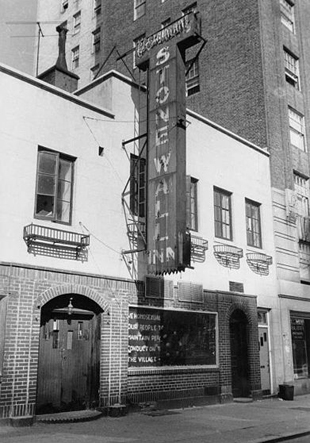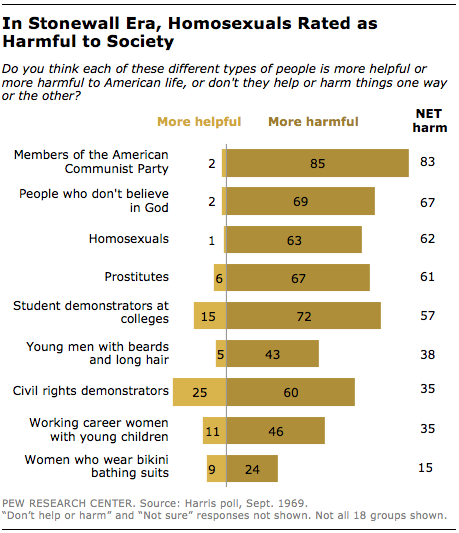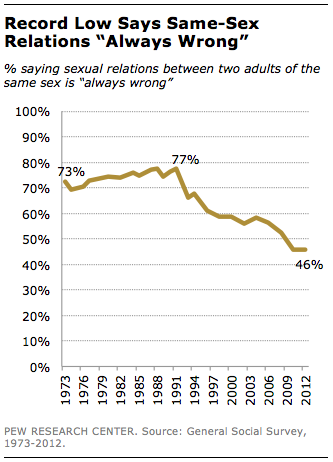
As the Supreme Court issued a key legal victory to same-sex marriage supporters today with its ruling on the Defense of Marriage Act, it’s worth looking back to an event that sparked a new discussion of homosexual issues – the Stonewall riots that occurred in New York City this week in 1969.
Early in the morning of June 28, 1969, police raided the Stonewall Inn in Greenwich Village, a popular bar for gay men. Police arrived to arrest these men for illegal homosexual acts; an uprising that night became a rallying point in the movement for gay rights.
A few months later, a Harris poll got a sense of how homosexuals were viewed by the public by asking whether homosexuals (and many other groups) were “more helpful” or “more harmful” to American life.
 By a margin of 63% to 1%, Americans said homosexuals were more harmful than helpful; 25% said homosexuals neither helped nor harmed and 10% were not sure. This balance of opinion at the time put homosexuals in similar esteem as prostitutes and atheists – although not as negatively viewed as Americans who were members of the Communist Party. Among other groups, civil rights demonstrators recorded 25% support as being more helpful, but a 60% majority said they were more harmful. (For reference, among the full list of 18 types of people, “young people who spend most of their time reading books” had the most positive ratings, 48% to 8%.)
By a margin of 63% to 1%, Americans said homosexuals were more harmful than helpful; 25% said homosexuals neither helped nor harmed and 10% were not sure. This balance of opinion at the time put homosexuals in similar esteem as prostitutes and atheists – although not as negatively viewed as Americans who were members of the Communist Party. Among other groups, civil rights demonstrators recorded 25% support as being more helpful, but a 60% majority said they were more harmful. (For reference, among the full list of 18 types of people, “young people who spend most of their time reading books” had the most positive ratings, 48% to 8%.)
 Attitudes have changed dramatically since then, especially in the past few decades. While there are no trends going all the way back to 1969, the General Social Survey has asked since 1973 if “sexual relations between two adults of the same sex” is always wrong, almost always wrong, wrong only sometimes or not wrong at all.
Attitudes have changed dramatically since then, especially in the past few decades. While there are no trends going all the way back to 1969, the General Social Survey has asked since 1973 if “sexual relations between two adults of the same sex” is always wrong, almost always wrong, wrong only sometimes or not wrong at all.
The public’s opposition to homosexual behavior stayed steady until the early 1990s. Back in the 1973 General Social Survey, 73% said sexual relations between two adults of the same sex was “always wrong” and 11% said it was “not wrong at all.” The share saying “always wrong” continued to be large and peaked at 77% in 1991, but public opinion has sharply shifted since then. Today, 46% say sexual relations between two adults of the same sex is “always wrong” and about as many (44%) say it is “not wrong at all.”
LGBT adults themselves say they have felt the relatively recent change in public opinion. Fully 92% of LGBT adults say society is more accepting of people who are LGBT than they were a decade ago and the same share says society will be more accepting a decade from now, according to a recent poll by Pew Research Center’s Social and Demographic Trends project. (See more about how LGBT adults see society and vice versa.)
In another sign of change, two-thirds of gay men and lesbians ages 18-29 shared their sexual orientation to a friend or family member before they were 20; among those age 50 and older – all of whom were born before Stonewall – just 35% came out before age 20.
Still, despite a more open society, 53% of LGBT adults today say there is a lot of discrimination today against the community and 58% have been subject to jokes or slurs because of their sexual orientation or gender identity.
In his inaugural address this year, President Obama paid homage to Stonewall in the same sentence as civil rights milestones in Seneca Falls and Selma. While the push for gay rights didn’t start with Stonewall and won’t end with today’s court rulings, the landscape of public opinion looks quite different today from how it did in the time of Stonewall.